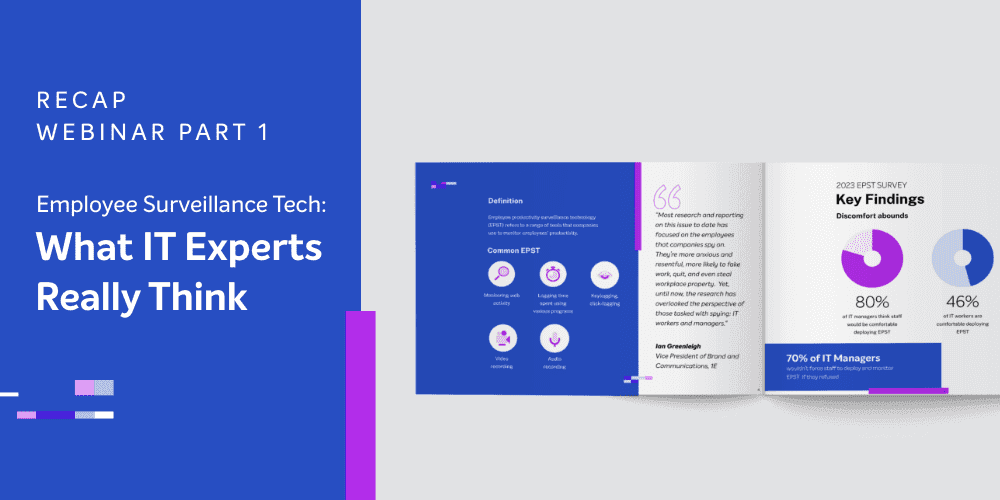1E partnered with Wakefield Research for a groundbreaking new report on one of today’s most controversial corporate practices: employee productivity surveillance technology (EPST).
The survey of 1,000 IT managers and IT employees found that while most companies use employee productivity surveillance tech (EPST), IT professionals have serious concerns about their role in the harm such technologies cause to coworkers, teams—and, counterintuitively—companies.
We recently hosted a webinar alongside Nathan Richter, Senior Partner at Wakefield Research, to discuss the report and how organizations can expect these trends to impact their business in the long and short term. In this blog we’ll look at some of the highlights and key takeaways from the session.
What is EPST?
Let's start from the beginning. What is EPST? Employee productivity surveillance technology (EPST) refers to a range of tools that companies use to monitor employees’ productivity. These tools could range from monitoring web activity, logging time spent using platforms, key/click-logging, video recording, audio recording.
Current research into this area of workplace tech has considered: growth and prevalence, employer motivation and beliefs, sentiment of surveilled employees, and the ethics/law around it. But we noticed that the perspective of some key stakeholders missing: IT teams.
Our survey set out to address the following questions:
- What are the hidden costs to IT workers told to deploy EPST?
- What negative impacts from EPST do IT workers and managers report?
- Will IT workers and IT managers push back on EPST?
- How do they feel about turning EPST on themselves?
Key findings
Nathan dug into some of the key findings and highlights of the research, including:
EPST is extremely common
The research highlights that use of this technology is more widespread than you may think. 83% of IT managers and 77% of IT workers current companies use some form of EPST. The number broadens when we consider respondents experiences at former companies. We can expect these numbers to continue growing in prevalence at a rapid rate. Of those surveyed whose current company isn't using employee surveillance technology, 79% believe it is at least somewhat likely that this will change in the next three years.
The empathy gap
So, how are IT workers and IT managers feeling about this? We see a disconnect between the two. Managers greatly underestimate how uneasy deploying EPST makes their staff. Only 8% of managers think their staff would be uncomfortable. But when we turned to IT workers to ask how they'd feel deploying EPST and monitoring their colleagues, the majority, at 54%, said they'd feel uncomfortable. This unearths a large gap that indicates managers arent in-tune with their teams sentiments.
Transparency is essential
How and if companies disclose their use of EPST to employees has an effect on the comfort level of people involved. The majority (95% of IT managers and nearly as many IT workers (895) would be more comfortable with their company using this tech if they were transparent about it. Despite this, we see another gap arise when it comes to disclosure in action. 50% of managers indicate their company wasn't fully transparent around its use of EPST.
Are you keen to learn more on this topic? Watch the full webinar here for more insights into the factors making IT uncomfortable, how they'd respond if instructed to deploy EPST, whether they'd tell colleagues of any known workarounds, and much more…
If you haven't already, you can download the 2023 survey report here.




